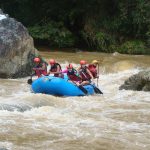As a travel expert, one of the things I’ve learned over the years is that a great trip doesn’t just happen—it’s planned. From choosing the right destination to organizing activities, packing your bags, and preparing for unforeseen circumstances, careful planning is key to having a successful and stress-free vacation. One aspect of travel that’s often overlooked, though, is personal safety. Whether you’re heading to a bustling city or a remote village, emergencies can happen. That’s why I always recommend travelers take the time to get CPR certified before embarking on their journey.
In this article, I’ll walk you through the essentials of planning your next trip and explain how CPR certifications can make a world of difference for your safety and peace of mind while traveling.
1. Set Your Travel Goals and Budget
The first step in planning any trip is figuring out what you want to accomplish. Are you looking to unwind on a beach, explore a cultural city, or take an active outdoor adventure? Once you’ve identified your goals, it’s time to budget. Think about all the expenses: flights, accommodations, activities, meals, and don’t forget that little buffer for unexpected expenses. Having a solid budget in place will help keep you on track throughout the planning process.
However, there’s one thing we often forget when planning our trips—emergencies. Whether it’s an injury or sudden illness, unforeseen medical situations can put a serious damper on your travels. Having CPR certification before you leave is a smart way to prepare for emergencies, especially when traveling in remote areas where access to medical care may not be immediate. Knowing what to do in a medical crisis could be the difference between handling the situation calmly or panicking.
2. Do Your Research on the Destination
No matter where you’re traveling, knowing the ins and outs of your destination is crucial. Look up information about the local culture, customs, and, most importantly, health and safety considerations. If you’re heading abroad, knowing the healthcare system, emergency numbers, and any region-specific health risks—like diseases or food safety concerns—can make a huge difference in your trip’s success.
This is where CPR certification becomes even more valuable. Medical emergencies can strike at any time, and when you’re in an unfamiliar place, you may not have immediate access to trained healthcare professionals. By taking a CPR course before your trip, you’re equipping yourself with the skills to respond to heart attacks, strokes, or choking incidents, regardless of where you are. Imagine being on a hike in the mountains or on a boat ride in a remote location, and someone suddenly needs help. Your CPR skills could help save a life before paramedics arrive.
3. Pack Smart—Don’t Forget the Essentials
Now comes the fun part: packing! While you’re thinking about clothes, toiletries, and tech gadgets, it’s important not to overlook the safety essentials. A well-stocked first aid kit should always be part of your travel preparation. Band-aids, antiseptic wipes, pain relievers, and any prescription medications you might need are a good starting point.
But there’s another item I highly recommend: a CPR face shield or mask. If you’re CPR certified, having this tool in your kit ensures that you can provide life-saving rescue breaths in a hygienic and safe way, which is crucial during an emergency. A CPR mask takes up very little space in your bag, but it can make a huge difference in emergency situations, especially if you’re in a location where medical assistance is far away.
Being prepared isn’t just about packing the right items—it’s about knowing how to use them effectively in case something goes wrong. By getting CPR certified, you’re adding a critical skill to your toolkit, and this could be a game-changer if an emergency occurs during your trip.
4. Book Your Accommodations and Transportation
With your goals, budget, and safety measures in place, it’s time to book accommodations and transportation. Whether you’re staying in a hotel, renting an Airbnb, or booking a guided tour, always check the safety features of your accommodations. Are there fire exits? Does the hotel have emergency protocols in place? What about nearby hospitals or medical facilities?
While booking transportation—whether it’s a rental car, flight, or local transport—think about how easy it is to access help in an emergency. Is there a nearby pharmacy or emergency medical center in case of illness? When you’re traveling in an unfamiliar place, you want to feel confident that help is available if you need it.
Knowing CPR also adds an extra layer of confidence. If you’re traveling with family or friends, you’ll be the one ready to take action if someone falls ill or has a medical emergency. You can lead by example and stay calm in a crisis, which is essential for maintaining composure and making the right decisions until professional help arrives.
5. Consider Travel Insurance
Travel insurance is one of those things you hope you’ll never need, but it can be invaluable if something goes wrong. Comprehensive travel insurance covers everything from cancellations to lost luggage to medical emergencies, and it’s especially important when traveling abroad. If you’re going to a country where healthcare might be expensive or difficult to access, travel insurance can help cover the costs of treatment.
Now, let’s say you’re in a remote destination and an emergency happens. You’re CPR certified, you know what to do, but sometimes, even with your best efforts, you might need advanced medical care. This is where travel insurance can step in. Many policies will cover emergency evacuation costs or treatment at a local facility, which can be a lifeline in certain situations. It’s reassuring to know that if the worst happens, you won’t be financially burdened as you focus on getting better.
6. Enjoy Your Trip with Peace of Mind
With all your planning and preparation done, you can finally enjoy your trip. Whether you’re exploring a city, hiking in the wilderness, or lounging on a beach, being prepared with CPR certification means that you’re not just ready to handle any emergency—it also means you can relax, knowing that you’re doing everything possible to keep yourself and your loved ones safe.
Traveling is about creating unforgettable experiences, and part of that is knowing that you’ve prepared for the unexpected. CPR training is a small investment with a big payoff. Whether you’re traveling solo or with others, having these life-saving skills will ensure that you can stay calm, act quickly, and be an asset to others in times of need.
Planning your next trip
Planning your next trip involves more than just booking flights and packing your bags. By prioritizing your health and safety—especially by getting CPR certified—you’re making sure that you’re ready to handle whatever comes your way. Travel can be unpredictable, but with the right preparation, you’ll be confident, calm, and ready to make the most of your adventure. Stay safe, enjoy the journey, and make every moment count!






Leave a Reply